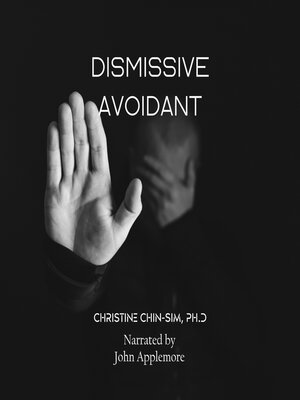The Dismissive Avoidant Attachment Style & How Childhood Traumas Can Result in Dysfunctional Behaviors in Adult Relationships
audiobook (Unabridged) ∣ Learn Your Triggers & Begin to Heal
By Dr. Christine Chin-Sim, Ph.D.

Sign up to save your library
With an OverDrive account, you can save your favorite libraries for at-a-glance information about availability. Find out more about OverDrive accounts.
Find this title in Libby, the library reading app by OverDrive.



Search for a digital library with this title
Title found at these libraries:
| Library Name | Distance |
|---|---|
| Loading... |
As a relationship and life coach, I've seen firsthand how entrenched ways of behaving, as a result of childhood trauma, can result in toxic and unhealthy relationships. These unhealthy relationships can leave one or both partners bruised and battered from chronic emotional abuse. Many become closed-off toward any prospect of having their heart ripped out, from yet another toxic relationship. Others, find themselves having the same types of relationship with different partners and asking the question, "Why do I keep attracting the same man/woman over and over again?"
As children, our experiences dictated how we attached to our caregivers. Unfortunately, how we attach to our caregivers, have also proven to be an indicator of how we now experience our close adult relationships; especially romantic ones.
In this book, I will be focusing on the Dismissive Avoidant Attachment Style, and how this style of attachment now dictates how this individual interacts with their significant others in romantic relationships.
Attachment styles affect every type of relationship, however, the effects are further magnified in romantic relationships, because of the lack of emotional intelligence and depth, this attachment style is challenged with.
In this book, you will learn how to identify the dismissive avoidant attachment style individual, some of the challenges they face in their relationships, and finally, given you some tools (exercises) to help move you toward a more secure way of experiencing relationships.







